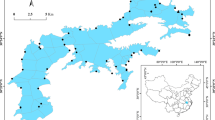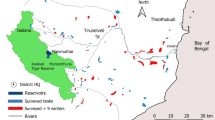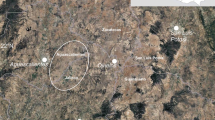Abstract
Rapid urbanisation increasingly isolates and exerts pressure on natural wetlands, particularly in the fast-growing developing countries of the tropics, including those of West Africa. Constructed wetlands such as sewage treatment plants, may unintendedly offer wildlife protection due to prohibitive access control and limited use, thereby attracting wary and specialised waterbirds in otherwise heavily disturbed formally protected wetlands with less polluted waterbodies. We present data from a rapid survey on 1-year post-opening colonisation and use of waterbirds in a recently constructed 11 ha restricted-access sewage treatment plant, situated in Ghana’s capital, Accra. During November-December 2013 and January 2014, nine daily counts in each month produced an accumulated count of >4200 observations belonging to 26 species of waterbirds, including several important Afro-Palaearctic and intra-African migrants, hereunder ardeids, piscivorous divers, waterfowl and waders. The distributional patterns of waterbirds clearly reflected local foraging opportunities and water quality parameters in the system of 12 inter-connected waste stabilisation ponds. A nearby semi-natural wetland with cleaner waterbodies, but higher levels of human interference, supported fewer waterbirds, predominantly commensal gregarious species. Our data suggests that strict protection from disturbances outweighs possible negative implications attributed to mere pollution of waterbodies supporting various waterbird guilds, thus highlighting the potential importance of informally protected sewage treatment plants distributed in functional networks, as a complement to designated wetlands. We anticipate that establishing similar or larger plants jointly will improve sewage treatment and waterbird conservation in urban Ghana, and West Africa in general.



Similar content being viewed by others
Data Availability
The datasets used and/or analysed during the current study are available from the corresponding author on reasonable request.
References
Adams WM (1993) Use of wetlands and sustainable development in West Africa. The Geographical Journal 159(2):209–218 https://www.jstor.org/stable/3451412
Afdhal B, Charfi-Cheikhrouha F, Moali A (2012) Tunisian man-made wetlands as alternative habitats for waterbirds and their role for conservation. African Journal of Ecology 51:154–163. https://doi.org/10.1111/aje.12022
Ashkenazi S (2001) Long-term trends in the breeding populations of waterbirds (1951-1985) at a sewage treatment plant. Ostrich 72(1-2):10–19. https://doi.org/10.2989/00306520109485277
Attuquayefio DK, Gbogbo F (2001) Prospects of conserving wetlands along the Mukwe lagoon at Nungua in the Greater Accra region of Ghana. West African Journal of Applied Ecology 2:65–75. https://doi.org/10.4314/wajae.v2i1.45564
Aynalem S, Bekele A (2008) Species composition, relative abundance and distribution of bird fauna of riverine and wetland habitats of Infranz and Yiganda at southern tip of Lake Tana, Ethiopia. Tropical Ecology 49(2):199–209 ISSN 0564-3295. https://tropecol.com/pdf/open/PDF_49_2/11%20Aynalem.pdf
Beatty WS, Kesler DC, Webb EB, Raedeke AH, Naylor LW, Humburg DD (2014) The role of protected area wetlands in waterfowl habitat conservation: implications for protected area network design. Biological Conservation 176:144–152. https://doi.org/10.1016/j.biocon.2014.05.018
Belle JA, Andries J, Nacelle C (2018) Managing wetlands for disaster risk reduction: a case study of the eastern Free State, South Africa. Jamba: J Disas Risk Stud 10(1):a400. https://doi.org/10.4102/jamba.v10i1.400
Davidson NC (2014) How much wetland has the world lost? Long-term and recent trends in global wetland area. Marine and Freshwater Research 65(10):934–941. https://doi.org/10.1071/MF14173
Dayathilake D, Lokupitiya E, Wijeratne V (2021) Estimation of soil carbon stocks of urban freshwater wetlands in the Colombo Ramsar wetland city and their potential role in climate change mitigation. Wetlands 41:29. https://doi.org/10.1007/s13157-021-01424-7
De Troyer N, Mereta ST, Goethals PLM, Boets P (2016) Water quality assessment of streams and wetlands in a fast growing east African city. Water 8(4):123. https://doi.org/10.3390/w8040123
Dean WRJ, Milton SJ, Forsyth HP, Tissiman DR (2015) Fluctuations in bird numbers on sewage treatment ponds in an arid environment, South Africa. Ostrich 86(1-2):145–153. https://doi.org/10.2989/00306525.2015.1029559
Dixon A, Wood A, Hailu A (2021) Wetlands in Ethiopia: lessons from 20 years of research, policy and practice. Wetlands 41:20. https://doi.org/10.1007/s13157-021-01420-x
Douglas I, Alam K, Maghenda M, Mcdonnell Y, Mclean L, Campbell J (2008) Unjust waters: climate change, flooding and the urban poor in Africa. Environment and Urbanization 20(1):187–205. https://doi.org/10.1177/0956247808089156
Dowsett-Lemaire F, Dowsett RJ (2014) The birds of Ghana - a handbook and atlas. Tauraco Press, Liège, p 714
Dudgeon D, Arthington AH, Gessner MO, Kawabata Z-I, Knowler DJ, Lévêque C, Naiman RJ, Prieur-Richard A-H, Soto D, Stiassny MLJ, Sullivan CA (2006) Freshwater biodiversity: importance, threats, status and conservation challenges. Biological Reviews 81:163–182. https://doi.org/10.1017/S1464793105006950
Erwin MR (2002) Managing wetlands for waterbirds: Integrated approaches. Waterbirds 25(Spec Publ 2):5–12 https://www.jstor.org/stable/1522447
Erwin KL (2009) Wetlands and global climate change: the role of wetland restoration in a changing world. Wetlands Ecology and Management 17:71. https://doi.org/10.1007/s11273-008-9119-1
Finlayson CM (2012) Forty years of wetland conservation and wise use. Aquatic Conservation: Marine and Freshwater Ecosystems 22(2):139–143. https://doi.org/10.1002/aqc.2233
Froneman A, Mangnall MJ, Little RM, Crowe TM (2001) Waterbird assemblages and associated habitat characteristics of farm ponds in the Western cape, South Africa. Biodiversity and Conservation 10:251–270. https://doi.org/10.1023/A:1008904421948
Gbogbo F (2007a) Impact of commercial salt production on wetland quality and waterbirds on coastal lagoons in Ghana. Ostrich 78(1):81–87. https://doi.org/10.2989/OSTRICH.2007.78.1.12.56
Gbogbo F (2007b) The importance of unmanaged coastal wetlands to waterbirds at coastal Ghana. African Journal of Ecology 45:599–606. https://doi.org/10.1111/j.1365-2028.2007.00778.x
Gbogbo F, Attuquayefio DK (2010) Issues arising from changes in waterbird population estimates in coastal Ghana. Bird Populations 10:79–87 https://www.birdpop.org/docs/journals/Volume-10/BPJ10-09_Gbogbo_and_Attuquayefio.pdf
Gbogbo F, Oduro W, Oppong SK (2008) Nature and pattern of lagoon fisheries resource utilisation and their implications for waterbird management in coastal Ghana. African Journal of Aquatic Science 33(3):211–222. https://doi.org/10.2989/AJAS.2008.33.3.3.615
Gbogbo F, Oduro W, Oppong SK (2009) Response of waterbird species to fluctuating water levels in tropical coastal wetlands. African Journal of Ecology 48:637–643. https://doi.org/10.1111/j.1365-2028.2009.01156.x
Giosa E, Mammides C, Zotos S (2018) The importance of artificial wetlands for birds: a case study from Cyprus. PLoS One 13(5):e0197286. https://doi.org/10.1371/journal.pone.0197286
Hamdi N, Ismail-Hamdi S (2014) Testing whether artificial wetlands as habitats for waterbirds are good alternatives to natural wetlands: a case study of dams located in northern Tunisia. Vie et Milieu 64:47–57 ISSN 0240-8759. https://www.cabdirect.org/cabdirect/abstract/20153373721
Harebottle DM, Williams AJ, Weiss Y, Tong GB (2008) Waterbirds at Paarl waste water treatment works, South Africa, 1994–2004: seasonality, trends and conservation importance. Ostrich 79(2):47–163. https://doi.org/10.2989/OSTRICH.2008.79.2.4.578
Harrison JA, Williams AJ, MacIver M (2010) Breeding site selection by colonial waterbirds given various combinations of constructed or natural alternatives over a 10-year period. Ostrich 81(3):197–203. https://doi.org/10.2989/00306525.2010.519535
Holbech LH, Gbogbo F, Aikins TK (2018) Abundance and prey capture success of common terns (Sterna hirundo) and pied kingfishers (Ceryle rudis) in relation to water clarity in south-east coastal Ghana. Avian Research 9:25. https://doi.org/10.1186/s40657-018-0116-7
Hsu C-B, Hsieh H-L, Yang L, Wu S-H, Chang J-S, Hsiao S-C, Su H-C, Yeh C-H, Ho Y-S, Lin H-J (2011) Biodiversity of constructed wetlands for wastewater treatment. Ecological Engineering 37(10):1533–1545. https://doi.org/10.1016/j.ecoleng.2011.06.002
Jost L (2006) Entropy and diversity. Oikos 113(2):363–375. https://doi.org/10.1111/j.2006.0030-1299.14714.x
Jost L, Chao A, Chazdon RL (2011) Compositional similarity and beta (ß) diversity. In: Magurran AE, McGill BJ (eds) Biological diversity - frontiers in measurement and assessment, 1st edn. Oxford University Press, New York, pp 66–84
Junk WJ, An S, Finlayson CM, Gopal B, Květ J, Mitchell SA, Mitsch WJ, Robarts RD (2013) Current state of knowledge regarding the world’s wetlands and their future under global climate change: a synthesis. Aquatic Sciences 75:151–167. https://doi.org/10.1007/s00027-012-0278-z
Keddy PA, Fraser LH, Solomeshch AI, Junk WJ, Campbell DR, Arroyo MTK, Alho CJR (2009) Wet and wonderful: the world’s largest wetlands are conservation priorities. BioScience 59(1):39–51. https://doi.org/10.1525/bio.2009.59.1.8
Kivaisi AK (2001) The potential for constructed wetlands for wastewater treatment and reuse in developing countries: a review. Ecological Engineering 16:545–560. https://doi.org/10.1016/S0925-8574(00)00113-0
Kleijn D, Cherkaoui I, Goedhart PW, Hout J, Lammertsma D, Fuller R (2014) Waterbirds increase more rapidly in Ramsar-designated wetlands than in unprotected wetlands. Journal of Applied Ecology 51(2):289–298. https://doi.org/10.1111/1365-2664.12193
Knapp S, Schmauck S, Zehnsdorf A (2019) Biodiversity impact of green roofs and constructed wetlands as progressive eco-technologies in urban areas. Sustainability 11(20):5846. https://doi.org/10.3390/su11205846
Lamptey AM, Ofori-Danson PK (2014) Review of the distribution of waterbirds in two tropical coastal Ramsar lagoons in Ghana, West Africa. West African Journal of Applied Ecology 22(1):77–91 eISSN: 0855-4307. https://www.ajol.info/index.php/wajae/article/view/108001
López-Perea JJ, Laguna C, Jiménez-Moreno M, Martín-Doimeadios RCR, Feliu J, Mateo R (2019) Metals and metalloids in blood and feathers of common moorhens (Gallinula chloropus) from wetlands that receive treated wastewater. Science of the Total Environment 646:84–92. https://doi.org/10.1016/j.scitotenv.2018.07.265
Mitchell SA (2013) The status of wetlands, threats and the predicted effect of global climate change: the situation in sub-Saharan Africa. Aquatic Sciences 75:95–112. https://doi.org/10.1007/s00027-012-0259-2
Murray CG, Hamilton AJ (2010) Perspectives on wastewater treatment wetlands and waterbird conservation. Journal of Applied Ecology 47:976–985. https://doi.org/10.1111/j.1365-2664.2010.01853.x
Murray CG, Loyn RH, Kasel S, Hepworth G, Stamation K, Hamilton AJ (2012) What can a database compiled over 22 years tell us about the use of different types of wetlands by waterfowl in south-eastern Australian summers? Emu 112:209–217. https://doi.org/10.1071/MU11070
Murray CG, Kasel S, Szantyr E, Barratt R, Hamilton AJ (2014) Waterbird use of different treatment stages in waste-stabilisation pond systems. Emu 114:30–40. https://doi.org/10.1071/MU12121
Nixon SW, Buckley BA, Granger SL, Entsua-Mensah M, Ansa-Asare O, White MJ, McKinney RA, Mensah E (2007) Anthropogenic enrichment and nutrients in some tropical lagoons of Ghana, West Africa. Ecological Applications 17(5):Supplement:S144–Supplement:S164. https://doi.org/10.1890/05-0684.1
Ntiamoa-Baidu Y (1991) Seasonal changes in the importance of coastal wetlands in Ghana for wading birds. Biological Conservation 57(2):139–158. https://doi.org/10.1016/0006-3207(91)90135-V
Ntiamoa-Baidu Y, Piersma T, Wiersma P, Poot M, Battley P, Gordon C (1998) Habitat selection, daily foraging routines and diet of waterbirds in coastal lagoons in Ghana. Ibis 140:89–103. https://doi.org/10.1111/j.1474-919X.1998.tb04545.x
O’Connell M (2000) Threats to waterbirds and wetlands: implications for conservation, inventory and research. Wildfowl 51:1–15 https://wildfowl.wwt.org.uk/index.php/wildfowl/article/view/1076
Okes NC, Hockey PAR, Cumming GS (2008) Habitat use and life history as predictors of bird responses to habitat change. Conservation Biology 22(1):151–162. https://doi.org/10.1111/j.1523-1739.2007.00862.x
Otieno NE, Mutati AS, Akoth C, Ogwanjg D, Mwinami T, Alaro P, Njoka J (2015) Role of invertebrate prey abundance on waterbird distribution across rice field growth stages in Western Kenya. Waterbirds 38(1):47–57. https://doi.org/10.1675/063.038.0107
Runge CA, Watson JEM, Butchart SHM, Hanson JO, Possingham HP, Fuller RA (2015) Protected areas and global conservation of migratory birds. Science 350(6265):1255–1258. https://doi.org/10.1126/science.aac9180
Santoul F, Mastrorillo S (2004) Gravel pits as new wetlands for the Little grebe Tachybaptus ruficollis. Vie et Milieu 54(1):31–36 https://hal.sorbonne-universite.fr/hal-03217988/document
Scholz M, Lee B-h (2005) Constructed wetlands: a review. International Journal of Environmental Studies 62(4):421–447. https://doi.org/10.1080/00207230500119783
Schuyt KD (2005) Economic consequences of wetland degradation for local populations in Africa. Ecological Economics 53:177–190. https://doi.org/10.1016/j.ecolecon.2004.08.003
Shokoufeh S, Almuktar SAAAN, Scholz M (2021) Impact of climate change on wetland ecosystems: a critical review of experimental wetlands. Journal of Environmental Management 286:112160. https://doi.org/10.1016/j.jenvman.2021.112160
Sutherland WJ, Alves JA, Amano T, Chang CH, Davidson NC, Max Finlayson C, Gill JA, Gill RE, González PM, Gunnarsson TG, Kleijn D, Spray CJ, Székely T, Thompson DBA (2012) A horizon scanning assessment of current and potential future threats to migratory shorebirds. Ibis 154:663–679. https://doi.org/10.1111/j.1474-919X.2012.01261.x
Uluocha NO, Okeke IC (2004) Implications of wetlands degradation for water resources management: lessons from Nigeria. GeoJournal 61:151–154. https://doi.org/10.1007/s10708-004-2868-3
van Biervliet O, McInnes RJ, Lewis-Phillips J, Tosney J (2020) Can an integrated constructed wetland in Norfolk reduce nutrient concentrations and promote in situ bird species richness? Wetlands 40:967–981. https://doi.org/10.1007/s13157-019-01247-7
Verhoeven JTA, Arheimer B, Yin C, Hefting MM (2006) Regional and global concerns over wetlands and water quality. Trends in Ecology & Evolution 21(2):96–103. https://doi.org/10.1016/j.tree.2005.11.015
Vickery JA, Ewing SR, Smith KW, Pain DJ, Bairlein F, Škorpilová J, Gregory RD, Fox T (2014) The decline of afro-Palaearctic migrants and an assessment of potential causes. Ibis 156:1–22. https://doi.org/10.1111/ibi.12118
Wang H, Wang T, Zhang B, Li F, Toure B, Omosa IB, Chiramba T, Abdel-Monem M, Pradhan M (2014) Water and wastewater treatment in Africa - current practices and challenges. Clean: Soil, Air, Water 42:1029–1035. https://doi.org/10.1002/clen.201300208
Wang R, Wu F, Chang Y, Yang X (2016) Waterbirds and their habitat utilization of artificial wetlands at Dianchi Lake: implication for waterbird conservation in Yunnan–Guizhou Plateau Lakes. Wetlands 36:1087–1095. https://doi.org/10.1007/s13157-016-0823-y
Wiegleb G, Dahms H-U, Byeon WI, Choi G (2017) To what extent can constructed wetlands enhance biodiversity? International Journal of Environmental Science and Development 8(8):561–569. https://doi.org/10.18178/ijesd.2017.8.8.1016
Willoughby N, Grimble R, Ellenbroek E, Danso E, Amatekpor J (2001) The wise use of wetlands: identifying development options for Ghana’s coastal Ramsar sites. Hydrobiologia 458:221–234. https://doi.org/10.1023/A:1013158329107
Wymenga E, Zwarts L (2010) Use of rice fields by birds in West Africa. Waterbirds 33(special Publication 1):97–104. https://doi.org/10.1675/063.033.s107
Acknowledgements
Firstly, great thanks to Mr. Alfred Ali Nuoh, Centre for African Wetlands, University of Ghana, who assisted in the identification and counting of birds at the LSTP. Secondly, we are grateful to the Managing Director, Mr. Deo Datus Appiah, Val Terra Ltd. (Tema), in liaison with the Accra Metropolitan Assembly, for granting permit, as well as encouragement of the work. Also great thanks to an anonymous editorial assistant, and two reviewers for their constructive criticism and editing of the manuscript. Finally, thanks to Dr. William Gblerkpor for assistance with drone imaging at the LSTP.
Code Availability
Not applicable.
Funding
This study did not receive any funding from any source or institution.
Author information
Authors and Affiliations
Contributions
Both authors contributed to the study, and read and approved the final manuscript; LHH conceptualised, designed and supervised the study, participated in the initial data collection, performed the majority of data analysis, initiated the draft, and prepared the final manuscript; CCC conducted the majority of data collection, and made contributions to material preparation and data analysis.
Corresponding author
Ethics declarations
Conflict of Interest
The authors declare that they have no conflict of interest.
Ethics Approval
Prior consent and permissions were obtained from respective authorities.
Consent to Participate
Not applicable.
Consent for Publication
Not applicable.
Additional information
Publisher’s Note
Springer Nature remains neutral with regard to jurisdictional claims in published maps and institutional affiliations.
Rights and permissions
About this article
Cite this article
Holbech, L.H., Cobbinah, C.C. Pollution or Protection - What Early Survey Data Shows on Rapid Waterbird Utilisation of a Newly Established Sewage Treatment Plant in Urban Ghana, West Africa. Wetlands 41, 110 (2021). https://doi.org/10.1007/s13157-021-01510-w
Received:
Accepted:
Published:
DOI: https://doi.org/10.1007/s13157-021-01510-w




